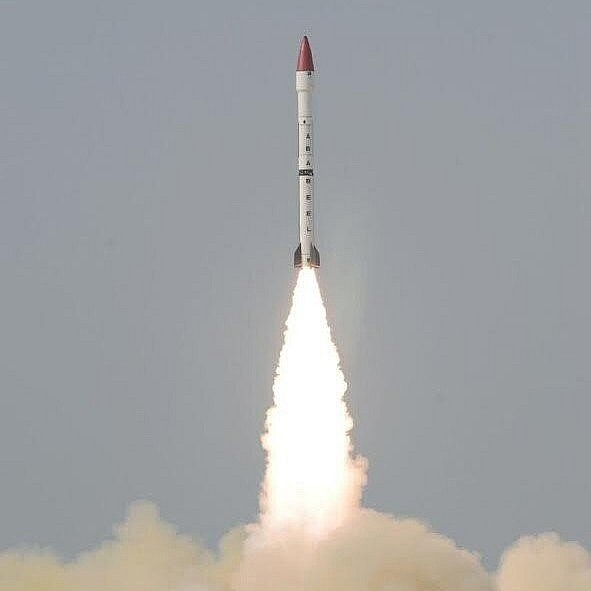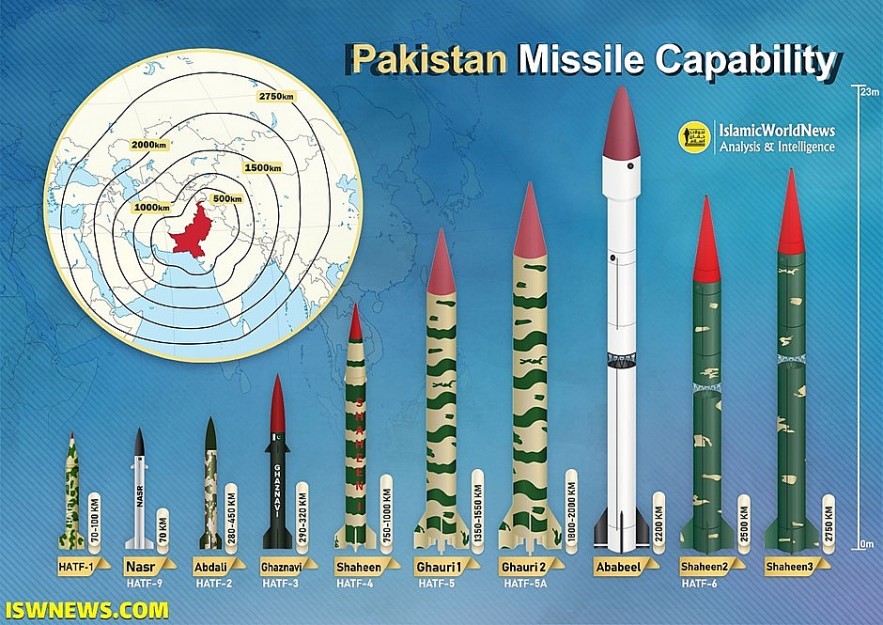Have US sanctions impacted Pakistan’s missile programme?
Given the advanced state of missile development that Pakistan has achieved, it is very unlikely that the latest round of American sanctions will have any major impact. The real target of US sanctions is China, whose companies doing business with Islamabad have been sanctioned.
This is the sixth round of sanctioned levied by the US on Chinese and Pakistani companies since 2021. The sanctions have targeted a Pakistan company and several Chinese “entities and one individual” for supplying equipment and technology for the development of ballistic missiles in Pakistan. The US action comes came two days after Pakistan carried out a second test of its Ababeel medium-range ballistic missile, which can carry multiple nuclear warheads.
 |
Despite regular round of sanctions, the fact remains that Pakistan’s missile development continues at an accelerated pace. The concern is that Pakistan’s missile programme has reached a stage where sanctions don’t really matter, and possibly the latest sanctions are more targeted at China! Thanks to Chinese and North Korean support Pakistan’s missile programme has reached a stage where only sanctions will not have any impact. Most Pakistani missiles have either been developed in collaboration with the Chinese or have been simply given a Pakistani name after bringing them from China. For example, in 2018, the South China Morning Post reported that China had sold Pakistan an advanced tracking system to boost Islamabad's efforts to improve ballistic missiles capable of delivering multiple warheads. The SCMP quoted from the website of the Chinese Academy of Sciences which announced the deal with Pakistan, and Zheng Mengwei, a researcher with the CAS Institute of Optics and Electronics, confirming that the purchase was of a "highly sophisticated large-scale optical tracking and measurement system."
In recent years, several instances have occurred of interdiction and tracking of consignments of dual-use items procured by Chinese entities from Europe and the United States for supply to Pakistan which have been interdicted in Indian ports. China’s assistance to Pakistan has come not only in the form of sourcing equipment but also in the provision of technology and services. The continuance of Chinese assistance comes in the form of both state entities and shell companies, finding alternative means via shell companies in third world countries to facilitate clandestine proliferation of missile parts and equipment.
While imposing the latest round of sanctions, the US administration claimed that the Beijing Research Institute of Automation for Machine Building Industry (RIAMB) has collaborated with Pakistan’s National Development Complex, which is involved in developing long-range ballistic missiles for Pakistan. This is specifically for testing large-diameter rocket motors for advanced systems like the Shaheen-3 and Ababeel missiles. Additionally, three China-based firms namely, Hubei Huachangda Intelligent Equipment Co, Universal Enterprise and Xi’an Longde Technology Development Co, have been targeted. Pakistan-based Innovative Equipment and a Chinese national, Luo Dongmei (also known as ‘Steel’ Luo) have also been put on the sanctions list all of them for “knowingly transferring equipment under missile technology restrictions”, the US State Department said, adding that, “…United States will continue to act against proliferation and associated procurement activities of concern, wherever they occur.” The US administration has said that sanctions are used to prevent the proliferation of Weapons of Mass Destruction, particularly long-range weapons.
The last round of sanctions was in April 2024 when the US blacklisted four companies from Belarus and China for supplying missile-applicable items to Pakistan’s long-range missile programme. At that time, Pakistan’s Foreign Ministry had said they had been imposed “without any evidence whatsoever” of foreign companies supplying its ballistic missiles programme. “We reject the political use of export controls,” Mumtaz Zahra Baloch, the foreign office spokesperson said in a statement, adding that some countries appear to enjoy exemptions from “non-proliferation” controls, obviously referring to increasing cooperation between the US and India in the defence sector. US concerns about Pakistan’s missile programme and possible collaboration with China date back to the early 1990s. With six rounds of sanctions imposed over the past four years, the Biden administration has taken a particularly aggressive stance in targeting entities it believes are supporting Pakistan’s missile programme.
 |
While US concerns about proliferation are genuine it has never quite managed to contain Pakistan’s nuclear and missile programme as is evidenced by the current advanced state of Pakistan’s missile programme and deployment. In its arsenal currently are three tiers of ballistic missiles, i.e., battlefield short range ballistic missiles, short range ballistic missiles, and medium range ballistic missiles. Pakistan has thus managed to develop a variety of deployed ballistic missiles, including tactical battlefield weapons like the Hatf to medium range ballistic missiles, like the Shaheen. These missiles can carry both conventional and nuclear warheads. Additionally, having developed and mated nuclear weapons to its missiles, Pakistan has moved forward with the first strike deterrence policy. For instance, the medium-range Shaheen-III, which can carry both conventional and nuclear warheads and can travel as far as 2,750km (1,708 miles), is Pakistan’s longest-range missile.
The nuclear issue remains an irritant in the US-Pakistan relationship and, despite the general improvement in Islamabad-Washington ties, regular sanctioning of entities signals that the US will continue to deploy both carrots and sticks in its engagement with Pakistan. However, a long-term view will inform that China is the real target of sanctions and Pakistan continues to thrive. For a nation perpetually on the doorstep of bankruptcy, how it manages to sink money into a expensive missile and nuclear programme is an issue that its international lenders must raise questions on.
Recommended
 World
World
Pakistan NCRC report explores emerging child rights issues
 World
World
"India has right to defend herself against terror," says German Foreign Minister, endorses Op Sindoor
 World
World
‘We stand with India’: Japan, UAE back New Delhi over its global outreach against terror
 World
World
'Action Was Entirely Justifiable': Former US NSA John Bolton Backs India's Right After Pahalgam Attack
 World
World
US, China Conclude Trade Talks with Positive Outcome
 World
World
Nifty, Sensex jumped more than 2% in opening as India-Pakistan tensions ease
 World
World
Easing of US-China Tariffs: Markets React Positively, Experts Remain Cautious
 World
World
